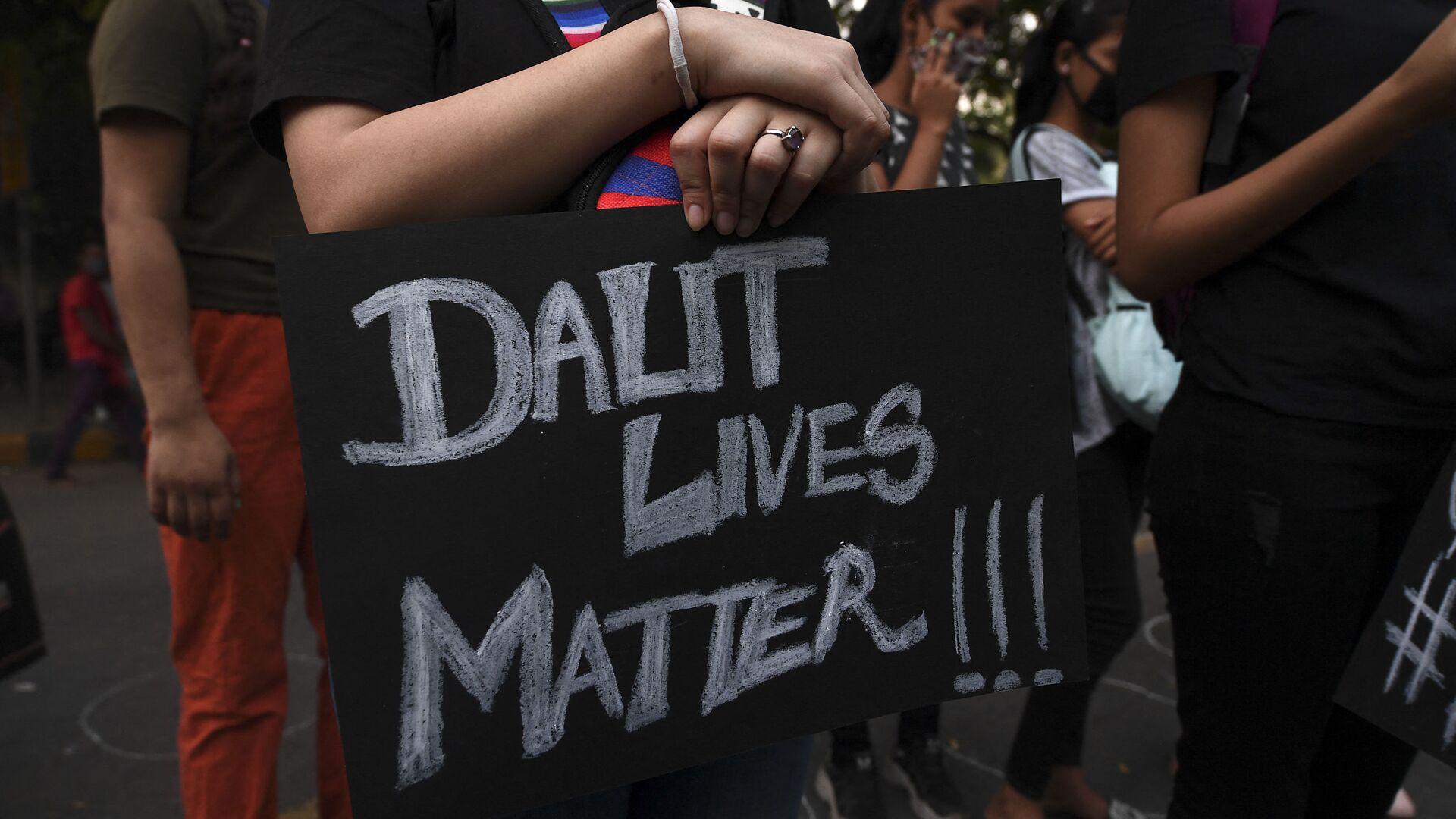https://sputnikglobe.com/20220415/indian-laws-designed-to-discriminate-against-the-poor-says-high-court-chief-justice-1094777053.html
Indian Laws Designed to Discriminate Against the Poor, Says High Court Chief Justice
Indian Laws Designed to Discriminate Against the Poor, Says High Court Chief Justice
Sputnik International
A legal case filed by an individual in India usually proves to be a lengthy and costly affair involving lawyer fees, security for oneself and one’s family... 15.04.2022, Sputnik International
2022-04-15T13:35+0000
2022-04-15T13:35+0000
2022-07-19T10:43+0000
dalit
lawyer
lawyer
poor
marginalisation
https://cdn1.img.sputnikglobe.com/img/07e5/07/0c/1083368581_0:131:3073:1859_1920x0_80_0_0_97c1d06fd1008ff5957a5212c9fd094a.jpg
Orissa High Court Chief Justice S. Muralidhar has said that Indian laws are structured to discriminate against the poor.The chief justice shared his observation on Thursday while delivering a speech at an event titled "Appearing in Court: Challenges in Representing the Marginalised"."There are many barriers to accessing justice that a marginalised person faces", Justice Muralidhar stated.Delivering remarks on the occasion of 'Ambedkar Jayanti', or the 131st birth anniversary of founder of Indian Constitution B.R. Ambedkar, Justice Muralidhar pointed out that 55 percent of the 372,000 people in India awaiting trial belong to the Scheduled Caste and Other Backward Classes.Of these people, 21 percent of the convicts belong to the Scheduled Caste. Similarly, 37.1 percent of convicts and 34.3 percent of the undertrials belong to Other Backward Classes. More than 17 percent of those undertrials and 19.5 percent of convicts are Muslims, the Orissa High Court Chief Justice revealed."Yet these are the persons who are likely to find it difficult to come forward to fight for their rights", he said.Even after these people are granted bail, they remain in jail because of their inability to arrange surety bonds, the chief justice stressed.His comments came at a time when three Muslim students are in jail, despite the Allahabad High Court granting bail to them on 30 March. As the students' families are struggling to pay INR 200,000 ($2,611) each to furnish bonds. In October, Uttar Pradesh state police arrested three Kashmiri students in an Agra city college for sedition after they reportedly posted on social media following Pakistan's victory in the T20 Cricket World Cup.Justice Muralidhar also expressed concern about the quality of legal aid for those unable to afford legal representation.In India, if a family is unable to bear the expense of a lawyer, the state government appoints a government lawyer on behalf of the family. Often, the family or undertrials never question the choice of lawyer."The poor believe that if you get any service for free or it is substantially subsidised, you cannot demand quality", he said.The chief justice also cited a study that says that human rights lawyers belonging to Dalit and Adivasi (tribal) are often labelled as "Maoist or Naxalite lawyers".
Sputnik International
feedback@sputniknews.com
+74956456601
MIA „Rossiya Segodnya“
2022
Deexa Khanduri
https://cdn1.img.sputnikglobe.com/img/07e4/0c/1e/1081607388_0:0:961:960_100x100_80_0_0_e9e931b8c1e18fb41f3074e2145d7a3a.jpg
Deexa Khanduri
https://cdn1.img.sputnikglobe.com/img/07e4/0c/1e/1081607388_0:0:961:960_100x100_80_0_0_e9e931b8c1e18fb41f3074e2145d7a3a.jpg
News
en_EN
Sputnik International
feedback@sputniknews.com
+74956456601
MIA „Rossiya Segodnya“
Sputnik International
feedback@sputniknews.com
+74956456601
MIA „Rossiya Segodnya“
Deexa Khanduri
https://cdn1.img.sputnikglobe.com/img/07e4/0c/1e/1081607388_0:0:961:960_100x100_80_0_0_e9e931b8c1e18fb41f3074e2145d7a3a.jpg
dalit, lawyer, lawyer, poor, marginalisation
dalit, lawyer, lawyer, poor, marginalisation
Indian Laws Designed to Discriminate Against the Poor, Says High Court Chief Justice
13:35 GMT 15.04.2022 (Updated: 10:43 GMT 19.07.2022) Deexa Khanduri
Sputnik correspondent
A legal case filed by an individual in India usually proves to be a lengthy and costly affair involving lawyer fees, security for oneself and one’s family against the opposing party, and regular attendance in court. All this makes it tough for the poor and marginalised to opt for a legal battle. At times, the case may last up to 15 years or more.
Orissa High Court Chief Justice S. Muralidhar has said that Indian laws are structured to discriminate against the poor.
The chief justice shared his observation on Thursday while delivering a speech at an event titled "Appearing in Court: Challenges in
Representing the Marginalised".
"There are many barriers to accessing justice that a marginalised person faces", Justice Muralidhar stated.
Delivering remarks on the occasion of 'Ambedkar Jayanti', or the 131st birth anniversary of founder of Indian Constitution B.R. Ambedkar,
Justice Muralidhar pointed out that 55 percent of the 372,000 people in India awaiting trial belong to the Scheduled Caste and Other Backward Classes.
Of these people, 21 percent of the convicts belong to the Scheduled Caste. Similarly, 37.1 percent of convicts and 34.3 percent of the undertrials belong to Other Backward Classes. More than 17 percent of those undertrials and 19.5 percent of convicts are Muslims, the Orissa High Court Chief Justice revealed.
"Yet these are the persons who are likely to find it difficult to come forward to fight for their rights", he said.
Even after these people are granted bail, they remain in jail because of their inability to arrange surety bonds, the chief justice stressed.
His comments came at a time when
three Muslim students are in jail, despite the Allahabad High Court granting bail to them on 30 March. As the students' families are struggling to pay INR 200,000 ($2,611) each to furnish bonds.
In October, Uttar Pradesh state police arrested three Kashmiri students in an Agra city college for sedition after they reportedly posted on social media following Pakistan's victory in the T20 Cricket World Cup.
Justice Muralidhar also expressed concern about the quality of legal aid for those
unable to afford legal representation.
In India, if a family is unable to bear the expense of a lawyer, the state government appoints a government lawyer on behalf of the family. Often, the family or undertrials never question the choice of lawyer.
"The poor believe that if you get any service for free or it is substantially subsidised, you cannot demand quality", he said.
The chief justice also cited a study that says that human rights lawyers belonging to Dalit and Adivasi (tribal) are often labelled as "Maoist or Naxalite lawyers".


